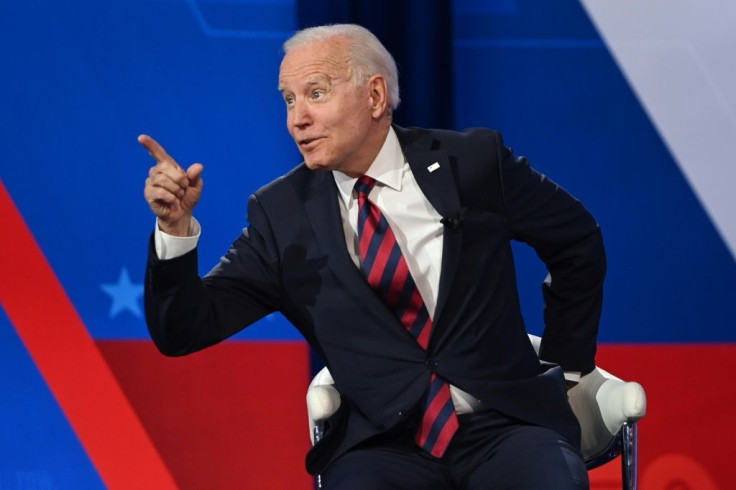Inflation Is Already Biting Americans Despite Biden Brushing It Off: The Companies Raising Prices

KEY POINTS
- Whirlpool warned of further price increases on rising costs
- Unilever looking at price hikes, among other steps, to manage costs
- Harley-Davidson has been hit with delayed shipping expenses and material costs
- General Mills is implementing a variety of strategies to offset increasing costs
President Joe Biden may be dismissive of rising inflation and its long-term impact on consumers, but more price rises are coming for Americans as several companies warn of rising costs and outline plans to offset them.
Appliance manufacturer Whirlpool is the latest among a slew of companies warning of price rises and inflation impact. The Benton Harbor, Michigan-based Whirlpool, which has already increased prices by as much as 12% in efforts to offset higher costs, said Thursday cost inflation could result in $1 billion in additional raw material costs, especially as raw material prices, such as resins and steel, have increased, Fox News reported.
Chief Financial Officer Jim Peters said Wednesday that pricing is “one of the tools we haven’t hesitated to use in the past” and warned that additional price increases could apply to certain categories, WSJ reported.
Unilever, one of the world's biggest producers of food, drink, beauty products and consumer goods, warned Thursday it will increase prices for salad dressings, cleaning products, and toiletries, The Guardian reported. The London-based company said commodity price increases have started affecting profitability, with CEO Alan Jope stating that Unilever is “facing very material cost increases.”
Will consumers buy it? Consumer-goods supplier Unilever is accelerating price increases as it copes with rising costs for raw materials, packaging and transportation. https://t.co/JJWt4hdfxn via @WSJ
— Paul Page (@PaulPage) July 22, 2021
Jope said average pricing increased by 2% in June. The company made no fewer than eight separate references to inflation in its half-year results statement, SkyNews reported, adding consumers "should brace themselves for price increases from a company whose brands range from Ben & Jerry's, Wall's and Magnum ice cream to Colman's mustard, PG Tips tea, Marmite spread, Dove soap, Lynx deodorant and Comfort fabric conditioner."
Pricing is “one of the tools we haven’t hesitated to use in the past,” Whirlpool CFO Jim Peters told @CFOJournal's @Nina_Trentmann, adding that the appliance maker could raise prices again. https://t.co/W4q1xE11lr
— WSJ CFO Journal (@WSJCFO) July 22, 2021
Earlier this month, Harley-Davidson, America's most iconic motorcycle brand, said it will implement an average of 2% pricing surcharge on a number of bikes sold in the U.S. The company, too, has been hit with mounting costs for raw materials and delayed shipping costs.
Cereal maker General Mills said July 1 that it saw inflation running at 7% this year, and outlined plans to manage the impact, which included price raises and putting less contents into packages, CNBC reported. The company has since raised food service business prices as part of the strategic cost management plan.
U.S. consumer prices rose 5.4% in June from a year ago, its highest increase in 13 years, Labor Department figures showed. Once prices rise, they hardly, if ever, come down.
But at a townhall Thursday, Biden said it is “highly unlikely” that the United States will experience long-term inflation that will be difficult to overcome, Bloomberg reported. Although he was largely dismissive of long-term inflation, it was the second time in a week that the president addressed the issue.
On Monday, Biden said, “My ‘Build Back Better’ plan will be a force for achieving lower prices for Americans looking ahead.” His argument: infrastructure and family support investments in his $4.5 trillion plan will fund long-term economic growth, increase the workforce and keep prices low.
President Biden on inflation concerns: "Our experts believe, and the data shows, that most of the price increases we've seen were expected and expected to be temporary." pic.twitter.com/yzihZXZODu
— The Hill (@thehill) July 19, 2021
Biden has reason to be concerned. Rising inflation could hurt vulnerable Democrats in next year's midterm elections. A PBS NewsHour/NPR/Marist poll said earlier this month that inflation is currently Americans’ leading economic worry, with 26% of adults concerned about rising prices, including 42% of those who supported Trump.

© Copyright IBTimes 2024. All rights reserved.






















